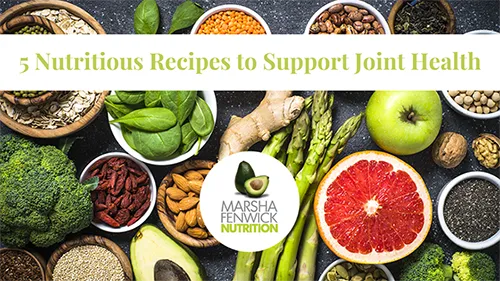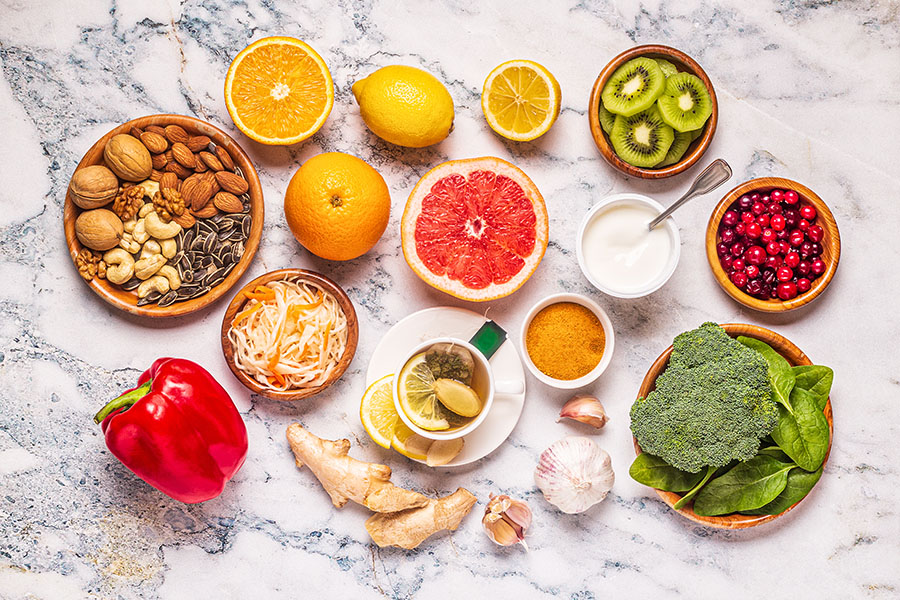10 Nutritional Strategies to Reduce Arthritis and Joint Inflammation
Arthritis, particularly osteoarthritis and rheumatoid arthritis, involves inflammation of the joints, causing pain and stiffness. While there’s no cure, nutrition can play a significant role in managing symptoms and supporting joint health. Here are some nutritional strategies to help improve arthritis:

Looking for simple, delicious ways to care for your joints? Download my 5 Nutritious Recipes to Support Joint Health & start feeling your best today!
1. Anti-Inflammatory Diet
Focus on anti-inflammatory foods to help reduce inflammation, a key factor in arthritis. These foods include:
- Fatty fish (salmon, mackerel, sardines): Rich in omega-3 fatty acids, which have powerful anti-inflammatory properties.
- Fruits and vegetables: Berries, oranges, apples, spinach, kale, and broccoli are rich in antioxidants and vitamins that combat inflammation.
- Nuts and seeds: Walnuts, flaxseeds, chia seeds, and almonds provide omega-3s and anti-inflammatory compounds.
- Olive oil: Contains oleocanthal, a compound with anti-inflammatory properties.
2. Increase Omega-3 Fatty Acids
Omega-3s, found in fatty fish, flaxseeds, chia seeds, and walnuts, help reduce inflammation in the joints. Studies have shown omega-3 supplementation can reduce symptoms of rheumatoid arthritis, including pain and stiffness.
3. Incorporate Antioxidant-Rich Foods
Antioxidants help neutralize free radicals, which contribute to inflammation and joint damage. Foods rich in antioxidants include:
- Berries (blueberries, strawberries, cherries): High in anthocyanins that may help reduce inflammation.
- Leafy greens (spinach, kale, collard greens): High in vitamins A, C, and K.
- Nuts (especially almonds and walnuts): Provide vitamin E, an antioxidant that helps fight oxidative stress.
- Green tea: Contains polyphenols, which may help reduce inflammation and pain associated with arthritis.
4. Incorporate Turmeric and Ginger
- Turmeric contains curcumin, a powerful anti-inflammatory compound. Including turmeric in your diet (tea, curries, or smoothies) can help reduce joint pain and stiffness.
- Ginger has anti-inflammatory and analgesic properties and may help reduce joint pain and swelling. Use fresh ginger in moothies, teas, or cooking.
5. Avoid Pro-Inflammatory Foods
Certain foods can increase inflammation and exacerbate arthritis symptoms. It’s best to limit:
- Processed foods: Often contain added sugars, unhealthy fats, and preservatives that can increase inflammation.
- Refined sugars and carbohydrates: Avoid sugary snacks, sodas, and refined flour products (white bread, pastries, cereals). View my favourite sugar substitutes >
- Fried foods: Often contain trans fats, which may increase inflammation.
6. Increase Fiber Intake
A high-fiber diet can help reduce inflammation. Fiber may help to lower C-reactive protein (CRP) levels, a marker of inflammation in the body. Some sources include:
- Whole grains (brown rice, quinoa, oats, buckwheat)
- Legumes (beans, lentils)
- Fruits (apples, pears, berries)
- Vegetables (broccoli, carrots, brussels sprouts, cauliflower, asparagus)
Try my Hearty Cruciferous Vegetable Soup Recipe>
7. Spices and Herbs
- Garlic contains sulfur compounds that may help reduce inflammation.
- Cayenne pepper (capsaicin) may reduce pain by affecting how nerves transmit pain signals.
- Rosemary and oregano are rich in antioxidants and may help reduce inflammation when added to meals.
8. Collagen and Gelatin
Collagen is the primary protein in joint cartilage. Taking collagen supplements may help support joint health and reduce pain. You can consume collagen in foods like bone broth. Some studies show that collagen peptides can improve joint pain and function in osteoarthritis.
9. Stay Hydrated
Proper hydration is important for joint health. The cartilage in your joints needs water to maintain its elasticity and prevent friction. Aim to drink plenty of water throughout the day and avoid sugary beverages or excessive caffeine, which can cause dehydration.
10. Probiotics for Gut Health
Gut health is closely linked to inflammation, and an imbalance in gut bacteria may worsen arthritis. Probiotics found in foods like yogurt, kefir, sauerkraut, and kimchi can help support gut health and reduce inflammation. Prebiotic foods like garlic, onions, asparagus, and bananas also support healthy gut bacteria.
You may also like Nourish, Move, and Strengthen Your Bones This Spring! for tips on how regular movement can help strengthen bones and prevent loss of bone density.
Disclaimer: This article is for general informational purposes and is not a substitute for personalized medical advice. Contact Marsha@marshafenwicknutrition.com for recommendations tailored to you.
Marsha Fenwick, C.N.P. R.R.T.
Marsha is not your typical nutritionist. She began her career 20 years ago as a Registered Respiratory Therapist. Later, she earned her certifications as a Registered Nutritional Consultant Practitioner, Certified Nutritional Practitioner, and Registered Orthomolecular Health Practitioner. Marsha is also a Certified Cancer Coach. Her clinical practice specializes in: sustainable healthy weight loss, digestive health, women's hormones, diabetes, heart health, and cancer prevention and recovery. Contact Marsha today for more information and to book a FREE 15 minute nutritional consultation.







